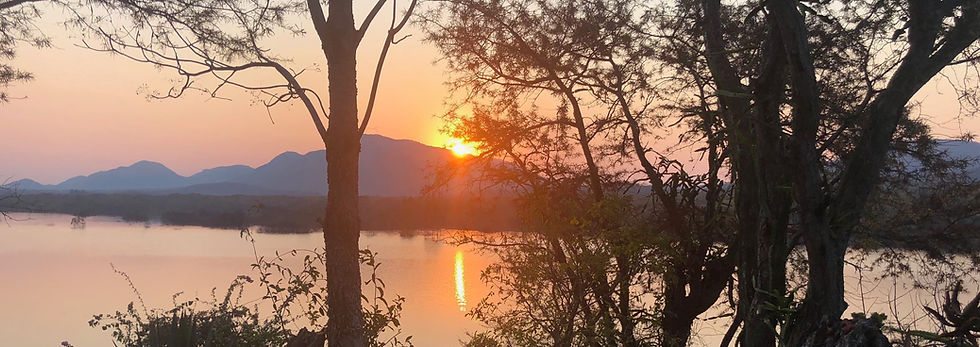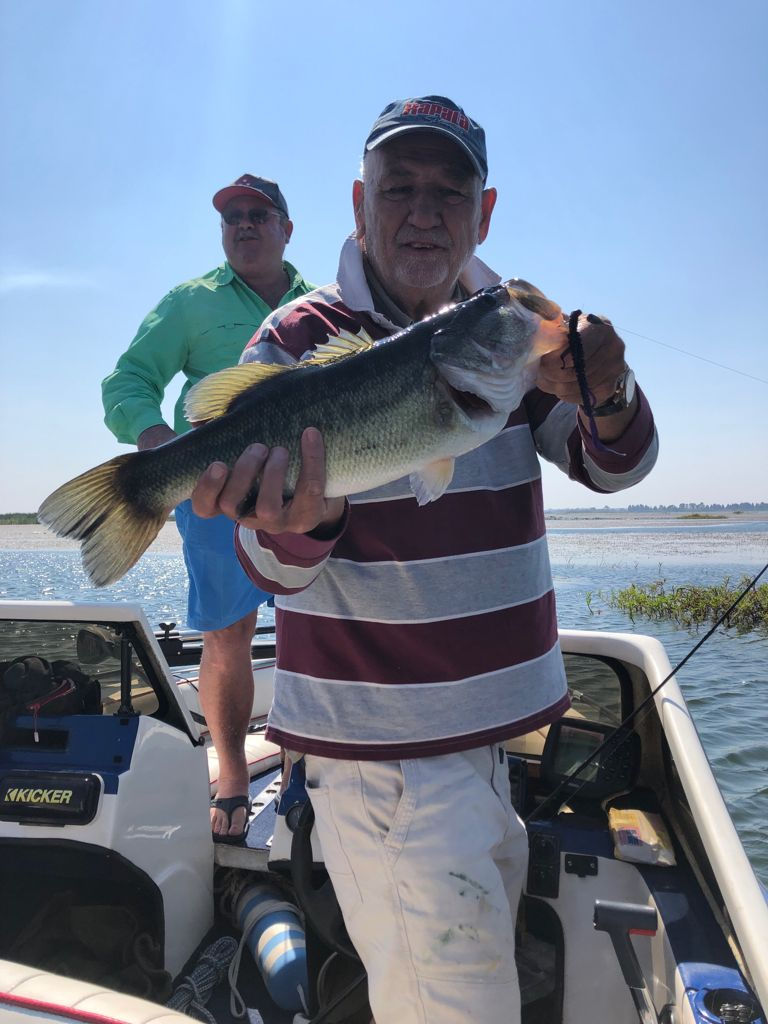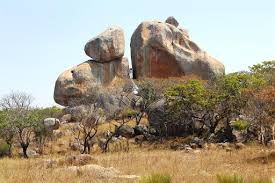
Already into our third week here in Zimbabwe with the house almost empty. Tonight, Friday is our last sleep taking mainly memories, with most of our belongings given to friends or sold. Belongings are just that, things. Rozanne has been very proactive. I just sort of hang around until the next fishing excursion. I am posting this from Dave and Lisa Clement’s home on the banks of Lake Mutirikwi in the Midlands of Zimbabwe, some 300 km South of Harare. Hopefully, I will get a rod in the water.
In the meanwhile, we have managed to meet up with some of our old friends. Including Kevin and Linda O’Toole. He was as cleverly vague as always, while Linda was, as always, both an elegant and a charming hostess. Having us around for lunch, they, in addition, invited two other of our old friends to join us. Both had recently lost spouses, they being Sue Stooks, Patrick having died of Covid-19 earlier in the year and Dave Middleton who lost Maureen, also recently. We reminisced the afternoon away talking about old friends scattered about the world. Too soon it was time to leave before the evening curfew.

The day before I had been taken to fish for bass on Darwendale with Choppy and Karen Steyn along with their son Sheldon. They caught fish, I didn't, but it allowed me to look onto Diandra from the water while reminiscing about our old neighbours. Henry and Tinks Bezuidenhout, who came up often along with Des Bruk-Jackson. Diandra had ten kilometres of shoreline on the lake, what a wonderful farm, where we had so many happy times. Patrick Zhuwao, Mugabe’s nephew, took over the farm when we were forced out. He, himself also having to flee the country later, when he fell out of political favour by backing Grace, Mugabe’s politically ambitious widow, against the present state president, Mnangagwa.
I was invited to visit but declined, the farm being vandalised. I have no wish to see the destruction of Diane, my first wife, and my lifework. Diandra is now sub-leased and wheat is now being grown instead of tobacco.
Choppy and Karen, as well as being good friends, worked with us on Diandra for over twelve years, Choppy in charge of the workshops and latterly farming, while Karen was in charge of administration and me. Wonderful loyal friends with two super kids, Sheldon and Tarryn who both grew up on the farm with us.
“When past employees become good friends, you know you have achieved something in life.” - Peter McSporran
I was lucky enough to be invited to go fishing again this week, once again with friends who were at one time employees. In clearing the house, we had to find a resting place for five sets of ashes, Rozanne’s dad, Bob Cary, her grandparents bar one, Bill Cary, May Cary, Murial Shattock, and Bill Love who died at Cockington where he rented a cottage in his retirement. So the official reason we returned to Lake Hunyani was to spread the ashes in the lake, also allowing for a bit of fishing. Rozanne suggested that if they wished, they could float downstream on the river to her and their old home, Cockington Estates. I did express a fear they may have trouble swimming that distance. Rozanne of course accompanied us this time and our hosts were Wayne and Joey Marais. Wayne and Joey also having been with us on Diandra following Choppy and Karen embarking on their own farming enterprise. Wayne and Joey were with us when we were forcibly removed from Diandra taking the brunt of the physical move, as I was in the process of advancing my shift to Zambia. Wayne was badly physically assaulted in the process. That is a story for another day. Wayne and Joey additionally became great friends of Shirley and Bob, Rozanne’s folks, often coming to their assistance in Zimbabwe during our absence. We will always be grateful for their past and present support, along with their friendship.

Wayne and Joey lived on one of our other farms, The Mede, which we passed through on the way to launch their boat at Antheia and Derek Bruk-Jackson's lodge on land that used to be farmed by their brother and my closest neighbour Desmond. Mede infrastructure is completely destroyed, every building stripped and broken down. Why do this for the benefit of stealing the roof sheets and window panes? Unfortunately, where we launched also brought sad memories as it was close to where Henry and Tinks Bezuidenhout's beautiful thatched house used to be, also burnt down by the land invaders.
Last week, being slightly reprimanded by Alison Taylor about being too negative about Zimbabwe, I agreed that if she sent me her recent experience, I would include it in the blog. Alison and Grant Taylor run their own milling company up in Catandica, Mozambique which was the heart of the Renamo Rebellion a couple of years ago. To get to or from Catandica in any direction, meant the running of an ambush gauntlet which they exercised often. When we first offered Grant the loans to start up his business, he suffered a severe heart attack which led to a heart transplant in South Africa. He has been healthy ever since, although at the time I asked him if he, “Had a change of heart about continuing with the project.”
Through all these troubles, they have survived and created a successful business. As we all know Alison is a strong character with the will to support Grant through thick and thin. She wrote verbatim:
“Grant had a sore on his face, which started in about November 2020 and due to his medication, one of the things to be watching is for skin cancer. It seemed to be getting better and then in December 2020; it grew externally, a very ugly looking growth which was almost noticeably increasing in size per day. With lockdowns in SA and Zim, we had to bide our time, which was a tough thing to get one's head around, especially when I had kids telling me “Mum it’s really growing”. We kept in contact with our plastic surgeon in Joburg, who Grant had seen on a couple of occasions, we sent him photos etc and the reply was the elective surgery is not yet able to be carried out. By mid Feb, I had a friend of mine in the medical field in Zim who recommended a plastic surgeon in Zim. She also was sent pictures etc, although land borders were still officially closed, the plastic surgeon was very helpful and willing to write letters etc for us to travel. Once she saw the growth on Grants face and suspected it was a squamous cell carcinoma and not a basal cell carcinoma; she suggested removing it all, sent for biopsy to ensure all the margins were removed and then sent Grant for scans of the glands to make sure nothing had spread. The treatment was great and so much easier for me doing to running around of dropping and collecting compared to SA, which I have plenty of experience at as well!”
So things are not all bad despite the horrific stories I get told about the treatment of some who have succumbed to Covid-19. I suppose similar stories can be found throughout the world where medical services are overstretched by the pandemic. The one thing in this whole pandemic is the fact that in many countries, it is impossible to see the family doctor. A visit to the family doctor often removes unnecessary stress and gives a feeling of well being even if the news sometimes is bad. Mental health is just as important as physical health. Why is the medical fraternity ignoring it?
The cost of being treated for Covid-19 here is huge, as much as $2,500 per day for a hospital bed before doctors fees and medication. Many businesses, from hunting to tourism are unlikely to recover as there are no financial safety nets in Africa. Of course, many call on help relying on the charity of local friends or family overseas. Dreadful for all unfortunate to catch the virus, there are many.
Farming Kick-Off in Zimbabwe
Although I attended the wedding in Manicaland, I planned to head back to Mashonaland and Salisbury in search of employment. I believe this was one of the important decisions impacting on where my life would lead. My father having put me in contact with David Smith, the Deputy Prime Minister and Minister of Finance, I intended to stick to that plan. A number of the guests at the wedding suggested I look for employment in Manicaland. Remaining there, I would have probably worked for a small operator or become a corporate employee with a large tea or forestry organisation. Whichever, I would have been slightly marginalised from the activity found closer to the capital city. My brother-in-law was working as an engineer for the Tanganda Tea Company, a secure, good job. My dream was to run my own farm. And my aim was to make my dream a reality. Little did I know that very many years later, I would become a director of Tanganda when it was listed on the stock exchange.
At the wedding, there were old friends of the Ross’s, Bill and Joyce Fox who offered me accommodation when I arrived in Salisbury. After nearly a week of sitting on the toilet with interludes of visits to the Bvumba and surrounds of Mutare, I set off in a green minibus to Salisbury. There was an efficient minibus service in those days, totally dissimilar to those that ply the route nowadays, where passenger safety is the last concern. The Foxes lived on Cheam Road in Marlborough, a house I was to often visit. The Foxes had three children, two married, with one remaining girl, Irene, who was still at school. She became my sister-in-law in later years when she married Mike Belinsky. Joyce was a gentle person who had been a school teacher while Bill was very pragmatic, hard-working with a very strong underlying toughness. No wonder he was of strong character as he was a survivor of the Japanese Prisoner of War marches and camps. He put his survival down to being a medic, which allowed him to access medicine, unlike many others. This toughness did not reduce his generosity and the Foxes were to entertain me for many years on my weekends (Saturday nights) off the farm.
On visiting David Smith, he informed me he had no vacancies at present; however his brother Hamish did. He organised an interview for me with Hamish at the Foxes house the next day. Things were happening. The next morning Hamish arrived informing us he had been close by that day, as he was dipping cattle at Bluffhill, now a suburb of Harare. He then informed us the property we were on in Marlborough had been the home farm of the Gilchrist's who had owned the farm Adylinn with the old farmhouse still standing where his wife Jean had been brought up.

The long and the short of it was that he offered me a job as a farm assistant manager with the princely sum of $70 per month salary starting on the 1st of February 1972. Just a few days later. This low offer was not due to his Scottish background, he said, rather that I would be in my first year, knowing nothing about African farming, I’d be more a liability than an asset in his operations. Of course, having recently graduated from college I thought I knew everything about agriculture, this was to be proved very wrong. In fact, agriculture is such a dynamic business, you never finish learning, but at that stage, I had not even started. Needless to say, I could not have found a better tutor or a nicer family to know and become friends with.
He agreed to collect me in a few days, first to take me shopping for farm clothes, a haircut then back to his farm Umzuzuru, at Nyabira. On pick up, we duly set off to Wynne Street to the Farmers Co-op where I purchased, on his farm account, under his instruction, khaki shorts, three pairs, khaki shirts, three pairs, long socks, five pairs and strong boots, one pair. Particular attention to the right boots, including the shoe polish. Lastly, upstairs for a haircut, there was me thinking my hair was short enough.
It was a good move as weekends off always started after paying labour on a Saturday afternoon. My time off was every second week if we were not busy on the farm. Critical times on the farm, not allowing time off, were during planting, harvesting or any emergency operation. We then set off to his home, a large modern homestead, pretty unique in those days in Zimbabwe where I was to live with him and his two sons who were still at school, Alistair and David. Alistair was to become a lifelong friend as were the elder Smiths until their deaths. They had a daughter, Margaret who had recently married Lindsay Crawford, a pioneer farmer in Tengwe, a new farming block in North-Western Rhodesia at that time.
So there I was about to learn some hard, although valuable lessons on how to farm in Rhodesia.
Compensation
This week I am including the third part of Rob Shaw’s interview with me, but before that, I would like to just mention compensation. Of course, every ex-farmer you meet in Zimbabwe wants to talk to you about compensation for the loss of their farms, homes and equipment. Why not, if you have all of your assets stolen by the state, often violently or forcibly, you should expect some recompense.
“The world has little sympathy for or has conveniently forgotten any recollection of events in and around the year 2000 when our farms were forcibly taken from us by the state using in the main pseudo-war veterans.” - Peter McSporran
Of course, for this compensation to happen it would require the respect of the rule of law by the incumbent administration. As the funds are well beyond the Zimbabwean Government's capacity, already heavily indebted, operating in an economic vacuum, a third party will have to supply the funds. Much of the renewed speculation is due to a supposed deal done with the Government to raise funds offshore from some party or state, as yet unknown. Even worse, many are fluting the rumour that payment is imminent. The source or why these unsubstantiated rumours are being spread, I cannot ascertain. So much anticipation and false hope being raised amongst the desperate.
My reluctant answer to those who ask me the question on my thoughts is not so positive. I fear, despite the present regime's efforts, that until the world recognises our government to have been democratically elected, the judiciary is seen to be independent and until we have a stable monetary system, it is unlikely to come about. As the money to be raised will be owed by the Government, any funds will have to go through them. They will have to offer guarantees. They are already defaulting on their own loans, therefore a very high credit risk. Governments sound powerful, but when it comes to borrowing money, they are just like any other entity. They have to have creditworthiness, the best form of that is track record. Zimbabwe’s track record gives no one comfort.
Any direct payments to the farmer would have huge risks including reputational risk, as would any grants which would probably be the only case if this surprisingly happened. If from a state or states, they will have their own political risk, having to satisfy their constituents it is a good thing and believe it will not only benefit those farmers compensated but the country as a whole. A complicated deal requiring huge discovery, administration, complicated legal documentation and transparency. Well beyond a small group, even if mandated, who believe their cronyism will solve the problem.
There are so many questions related to identifying the rightful present beneficiaries, ownership, tax implications here and or abroad. For many elderly people, it is already too late, they have died paupers. Many are desperate now. Every hour is a challenge getting through the day.
“The one thing that gives each claimant credibility, is his now cancelled title deed. This is a record of ownership supported by Zimbabwean Government surveys substantiating the land boundaries. The most credible record. The title deed is important, even when taken from you.” - Peter MacSporran
I fear there will be no quick fix. How happy I would be if proven wrong?
Rob Shaw’s third interview with me.
If you would like to learn more about Rob Shaw, his Linkedin address is: linkedin.com/in/robert-shaw-54b9057
Disclaimer: Copyright Peter McSporran. The content in this blog represents my personal views and does not reflect corporate entities.
Comments